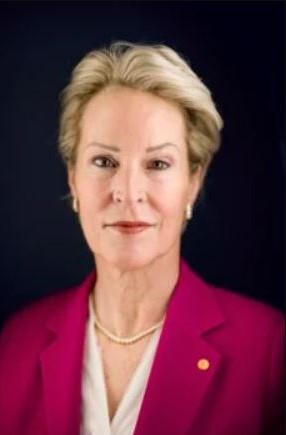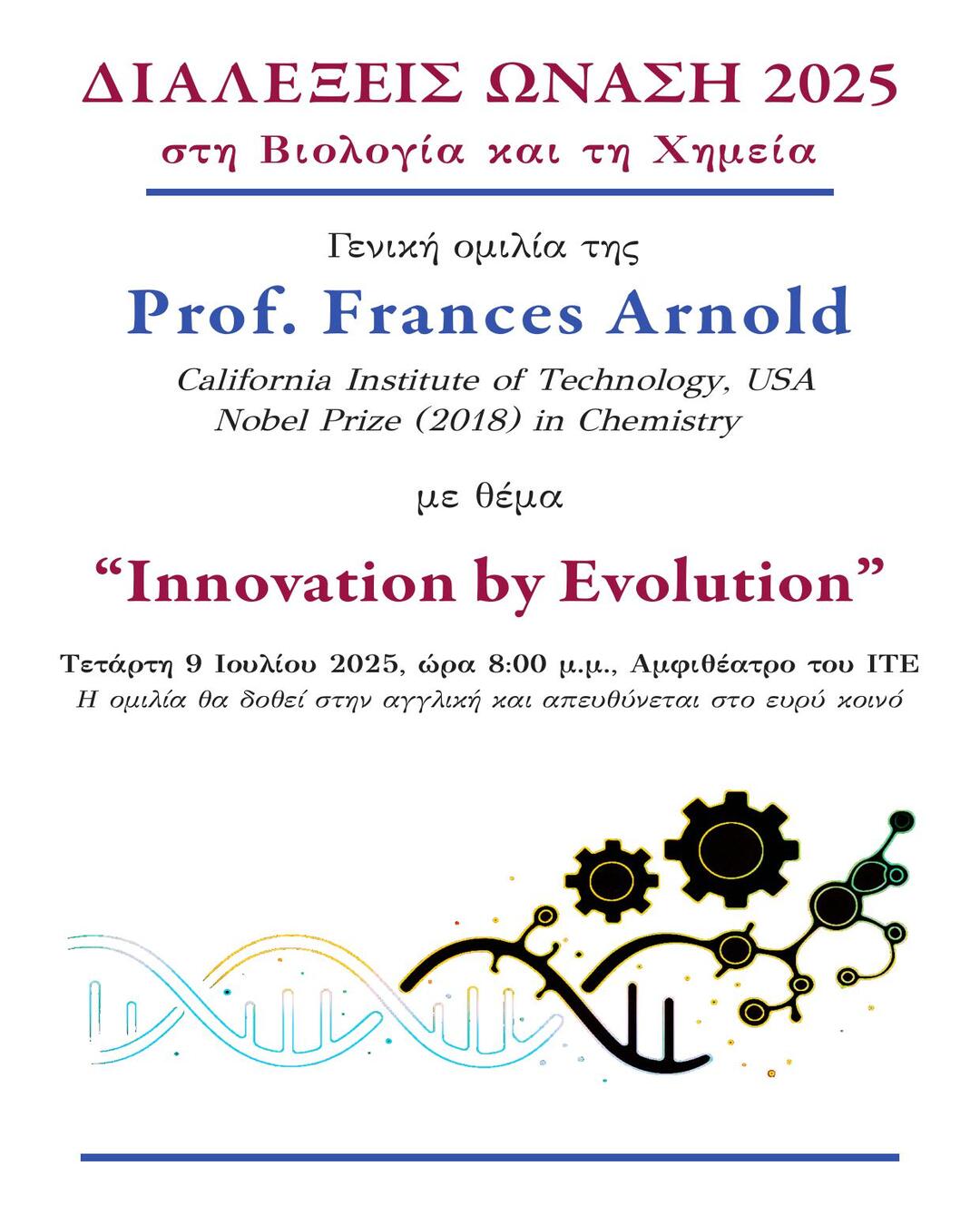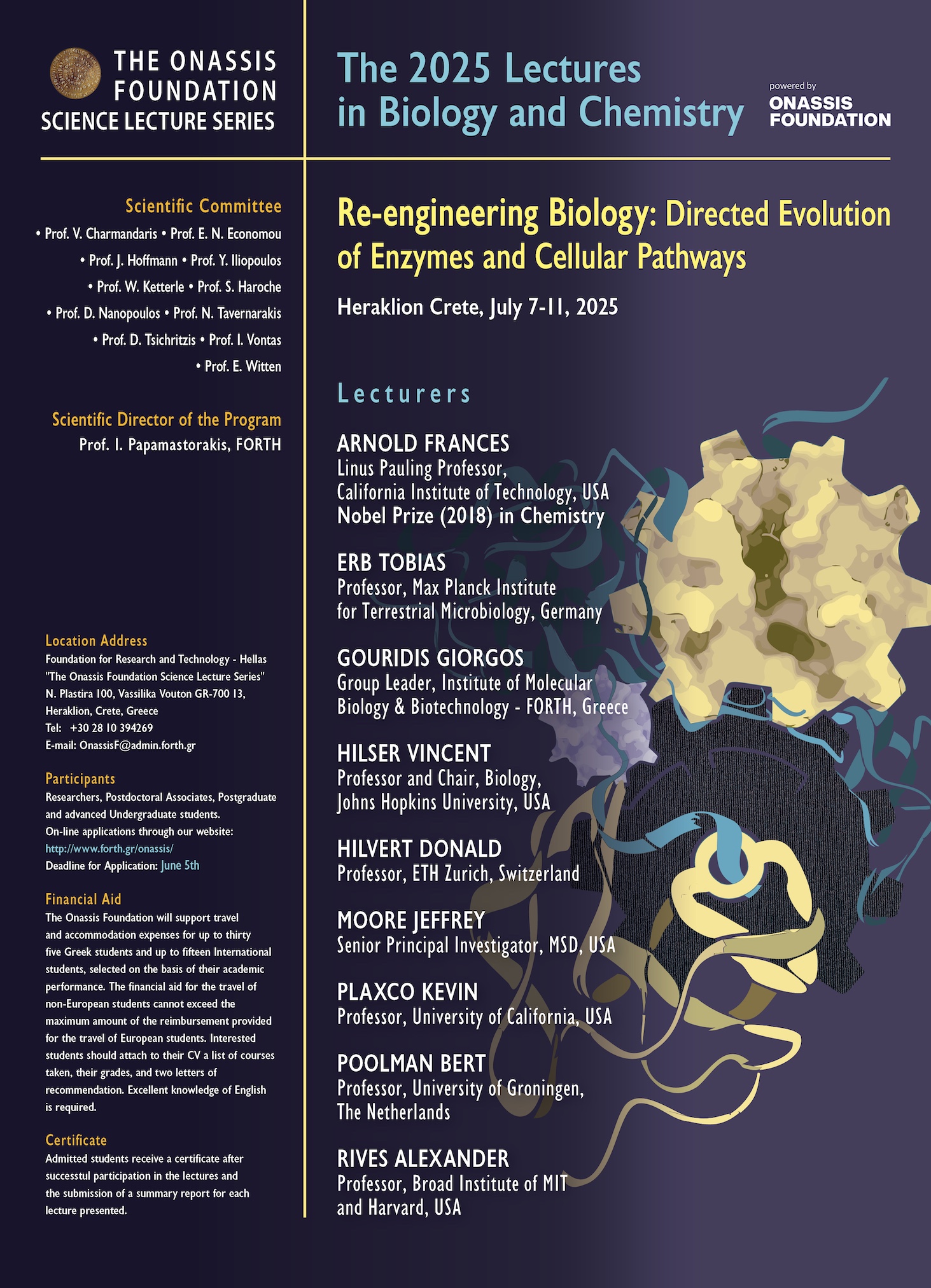Announcements

The Onassis Foundation Science Lecture Series 2025
The Onassis Foundation Science Lecture Series 2025 (in Biology and Chemistry), that were held from 07 to 11 of July at the Foundation for Research & Technology-Hellas, in Heraklion, Crete, aimed to further educate and promote young, talented scientists, postgraduate and Postdoctoral candidates, Graduate and advanced Undergraduate students in the field of physical and life sciences. This year’s series of lectures titled "Redesigning Biology: Directed Evolution of Enzymes and Cellular Pathways", were devoted to one of the most dynamic and rapidly evolving fields of modern biology — where laboratory evolution and synthetic biology intersect with artificial intelligence and cutting-edge technology.
Throughout the week, distinguished international scientists presented front-line research and applications in areas such as biocatalysis, metabolic pathway redesign, structural and computational biology, and minimal/simplified cell technologies.

The keynote Speaker of this year’s lectures, Prof. Frances Arnold, Nobel Laureate in Chemistry (2018), gave a public lecture entitled: “Innovation by Evolution”, on Wednesday, July 9, 2025 at 20:00, at the G. Lianis Auditorium of FORTH.
The speech was addressed to the general public and was broadcasted online, via the DIAYLOS platform. Frances Arnold is a highly distinguished figure in the fields of Science and Technology. In addition to receiving the Nobel Prize in Chemistry, she is the first female scientist to ever be elected as a Fellow of all three National Academies of the USA (Engineering, Medicine, Science).

The Onassis Lectures 2025 featured nine International Scientific Leaders, all of whom are at the forefront of research in the field of this year’s theme.
Frances Arnold
Professor, California Institute of Technology, USA,
Nobel Prize (2018) in Chemistry
Tobias Erb
Professor, Max Planck Institute for Terrestrial Microbiology, Germany
Giorgos Gouridis
Group Leader, Institute of Molecular Biology & Biotechnology - FORTH, Greece
Vincent Hilser
Professor and Chair, Biology, Johns Hopkins University, USA
Donald Hilvert Professor, ETH Zurich, Switzerland
Jeffrey Moore
Senior Principal Scientist, Merck, USA (M.S.D. Europe)
Kevin Plaxco
Professor, University of California, USA
Bert Poolman
Professor, University of Groningen, The Netherlands
Alexander Rives
Professor Broad Institute of MIT and Harvard, USA

This year, 50 students from universities in Greece and abroad have been selected to participate in the Onassis Lectures 2025 based on outstanding academic performance. Their travel and accommodation expenses in Heraklion were fully covered through the support of the Onassis Foundation. An additional 62 students have also been accepted (following the same criteria) but without financial support.
ABOUT THE LECTURES
First established in 2001, the Onassis Foundation Science Lecture Series was held for the 29th consecutive time in Heraklion, Crete, co-organized by the Onassis Foundation and the Foundation for Research and Technology – Hellas (FORTH).
The Lectures focus on trailblazing scientific topics and are internationally recognized as one of the most prestigious educational initiatives of their kind.
Each annual series lasts one week and features leading scientists from around the world. Among the speakers of previous years are 24 Nobel Laureates, 5 Turing Prize winners and Fields Medal winner Edward Witten.
The aim of the lectures is to provide talented graduate and senior undergraduate students from Greece and abroad the opportunity to deepen their understanding of frontline scientific challenges, under the guidance of world-renowned scientists.
The Onassis Foundation’s mission is to unleash the creative potential of individuals who want to develop their research with the best possible prospects in the fields of education, health, and culture.
The 2025 Onassis Foundation Lectures in Biology and Chemistry
Biological systems have evolved through billions of years of natural selection, which has favored the configuration of molecular structures and metabolic pathways in a way that maximizes the chances of survival in an ever-changing environment. However, ‘natural’ solutions are not always ideal for humanity's needs, particularly in areas such as sustainable chemistry, renewable energy and biomedicine.
Directed evolution, a laboratory-based technique inspired by natural selection, enables the design of proteins, enzymes, and metabolic networks with improved or entirely novel functions. Through successive cycles of mutation and selection, researchers can “navigate” complex evolutionary landscapes, creating molecules with biotechnological or pharmaceutical value. This method has become a key tool in modern biotechnology, thanks to technological advances in automated analysis, computational design and artificial intelligence.
A key pioneer in this field is Frances Arnold, who has been awarded the 2018 Nobel Prize in Chemistry. Her work showed that laboratory evolution can go beyond rational design in the development of molecules with complex functions. Her contribution has been recognized as a catalyst for radical change in the way new technologies are developed in chemistry and biology.
Beyond enzymes, synthetic biology aims to reconstruct and redesign entire cellular processes. Among other advances, researchers are developing metabolic pathways capable of capturing and converting carbon dioxide (CO₂), offering innovative solutions to environmental and energy challenges. At the same time, significant progress has been made in the design of simplified or minimal cells, the study of membrane dynamics, and the modeling of protein evolutionary trajectories based on statistical thermodynamics.
The rapid development of artificial intelligence has rapidly strengthened the field, with the use of protein language models and 3D structure prediction tools that now make it possible to design functional biomolecules entirely computationally.
This year's Onassis Lectures were dedicated to the technological and conceptual challenges and perspectives of this exciting era in biology. The series featured world-renowned researchers in the fields of enzyme engineering, synthetic metabolic biology, simplified cell engineering, thermodynamic evolution of proteins and AI-assisted biomolecular design.
........................................................................................
For more information:
Prof. Giannis Papamastorakis
Professor Emeritus, University of Crete
Scientific Director of the Onassis Lectures
Email: onassisf@admin.forth.gr








